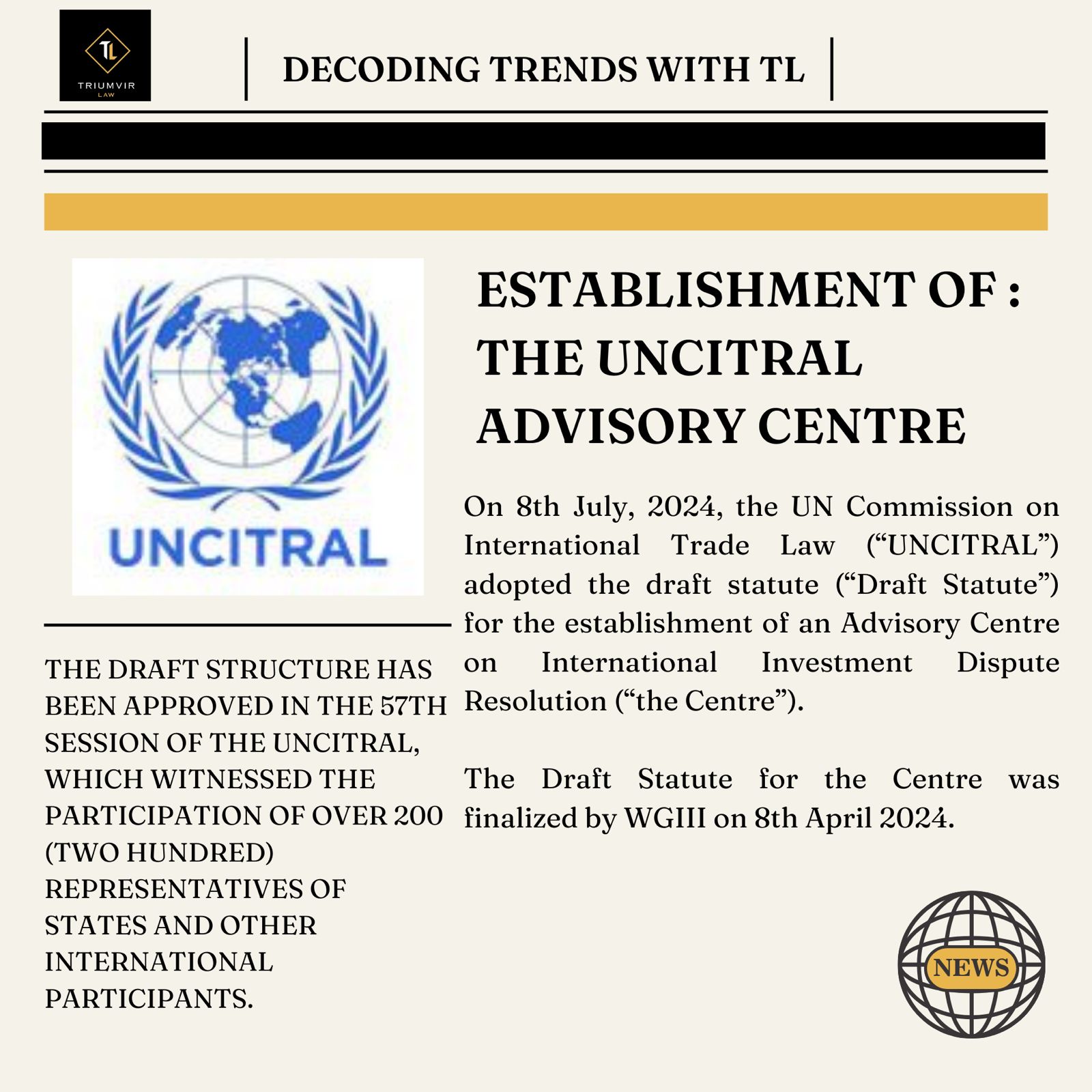
Decoding Trends With Trumvir Law

Assessing the powers of the NCLT, in light of the recent judgment of the Calcutta High Court in Eastern Indian Motion Picture Association & Ors. v. Mr. Milan Bhowmik
- May 1, 2024
- Decoding Trends With Triumvir Law
- Anubhab Sarkar & Sanyukta Agrawal
The Indian courts have frequently delved into the matter of arbitrability of disputes, establishing insightful criteria for its determination. Among the contentious issues examined is the arbitrability of shareholder disputes. Addressing the ambiguity surrounding this subject under the Arbitration and Conciliation Act, 1996, the Supreme Court of India provided clarification in the seminal case of Booz Allen & Hamilton Inc v. SBI Home Finance Inc.[1] Here, the Supreme Court made a crucial distinction between adjudication of rights in rem (i.e., rights enforceable against the general public) and rights in personam (i.e., interests safeguarded solely against specific individuals). It was held that, as a general principle, disputes concerning rights in personam are deemed arbitrable, whereas disputes involving rights in rem are mandated to be resolved by courts or specially constituted tribunals. Cases such as Vidya Drolia v. Durga Trading Corporation[2] have further addressed the issue of arbitrability of disputes.
Moreover, conflicts among shareholders of a company are increasingly prevalent. The statutory remedies outlined in the Companies Act 2013 stand as a robust safeguard for shareholders’ interests, alongside the tailored protection clauses that shareholders may include in transactional agreements. It is noteworthy that the Companies Act, 2013, by virtue of Section 242, explicitly bars the jurisdiction of civil courts concerning matters falling under the purview of the National Company Law Tribunal (“NCLT”) or the National Company Law Appellate Tribunal (“NCLAT”). Hence, the NCLT and the NCLAT are endowed with exclusive jurisdiction to adjudicate shareholder claims, particularly those concerning oppression and mismanagement.[3]
The NCLT is established under the Companies Act, 2013, in India and possesses designated powers pertaining to various company affairs. Among its responsibilities is the adjudication of matters related to the oppression of minority shareholders, among others.
In the case of Sidharth Gupta and Ors v. Getit Infoservices Pvt Ltd,[1] the NCLT observed that the provisions related to oppression and mismanagement under the Companies Act 2013 are triggered when the matters at hand transcend mere contractual disputes and involve significant acts of oppression. Consequently, the NCLT referred the parties to arbitration, stating that the underlying issue was fundamentally contractual, and framing it as oppression wouldn’t divest the arbitral tribunal of its jurisdiction.
Further, in the case of Rakesh Malhotra v. Rajinder Kumar Malhotra and Ors,[2] the Bombay High Court determined that disputes pertaining to oppression and mismanagement, when appropriately raised, cannot be directed to arbitration due to the inherent nature and authority vested in the NCLT.
The assessment typically revolves around determining whether the dispute arises solely from a contractual obligation or falls within the purview of areas where the NCLT holds jurisdiction. If the dispute is primarily contractual, it is generally considered arbitrable. However, if it pertains to matters falling under the NCLT’s specified areas of authority, then arbitration may not be permissible, and parties might need to address the issue through proceedings before the NCLT.
The aforementioned cases unequivocally illustrate that the courts have consistently placed significant emphasis on the provisions outlined in the Companies Act 2013. This emphasis ensures that any recourse to arbitration does not deprive the parties involved of their statutory protections. In summary, the courts have consistently affirmed that disputes falling within the jurisdiction of the NCLT must be directed to the NCLT for resolution, and alternative forums, tribunals, or courts cannot be pursued for the same matter.
However, recently, the Calcutta High Court in the case of Eastern Indian Motion Picture Association & Ors. v. Mr. Milan Bhowmik[3] (“EIMPA”) adopted a divergent approach. The Calcutta High Court encouraged a departure from the provisions of Section 430 of the Companies Act, 2013, which limits the authority of civil courts and assigns exclusive jurisdiction to tribunals like the NCLT to adjudicate on matters which fall within the jurisdiction of the tribunals, for instance shareholder disputes, as per the scope of the said act. Hence, the Act expressly prohibits civil courts from adjudicating on any matter exclusively within the jurisdiction of the NCLT as delineated by the Act.
Section 241 of the Companies Act, 2013 clearly states that shareholders who feel aggrieved have the authority to file a complaint before the NCLT if they believe that a company’s management is either mishandling affairs or operating unfairly, to the detriment of the company, its shareholders, or the public. Additionally, if business practices deviate from standard norms, shareholders also have the right to seek recourse through the NCLT.
This unequivocally establishes that the NCLT holds the authority to settle disputes concerning companies and shareholders, particularly those related to oppression and mismanagement, as evidenced by the cases discussed earlier.
In the recent EIMPA case, the respondents explicitly challenged the jurisdiction of the Calcutta High Court, citing the statutory prohibition in Section 430. They emphasized that the subject matter of the lawsuit clearly fell within the scope of Section 241, asserting that the NCLT possessed the authority to adjudicate upon it. Consequently, they argued that the matter lay outside the jurisdiction of the Calcutta High Court.
The respondents further argued that Section 244 of the Companies Act, 2013 allows for the minimum requirement of members to file a complaint under Section 241 to be waived, since the present matter was initiated by 2 (two) members only. Specifically, in cases where a company does not have a share capital, the minimum requirement is not less than one-fifth of its total number of members. However, Section 244 empowers the Tribunal to waive all or any of these requirements upon application.
However, the Calcutta High Court dismissed this argument, asserting that addressing the waiver application would consume time. The court also deemed a civil suit as a more efficient remedy for the plaintiffs. Moreover, it noted that even if the plaintiffs approached the tribunal to waive the eligibility criteria, there was no assurance that the tribunal would grant the application. In the event of the tribunal’s rejection, the plaintiffs would then have to resort to the civil court. Therefore, the court justified the plaintiffs’ decision to pursue an existing remedy rather than one contingent on an uncertain condition.
The reasoning provided by the Calcutta High Court does indeed appear to prioritize convenience over the statutory provisions and protections established by the Companies Act. While the court highlighted the potential time-consuming nature of the waiver application process before the NCLT, this reasoning may not adequately justify deviating from the statutory framework. Further, pursuing a matter in a civil court could also very well result in prolonged legal proceedings, keeping in mind the past track record. Thus, the Court’s rationale seems to lack robust legal backing and may be perceived as prioritizing expediency over adherence to established legal provisions and protections.
The Calcutta High Court’s decision diverged from the established statutory framework, as both the NCLT and the NCLAT serve as singular destinations for adjudicating disputes related to a company’s affairs. Numerous courts have consistently recognized the unequivocal nature of the bar outlined in Section 430. The primary objective behind establishing the NCLT and the NCLAT is to prevent the proliferation of forums for initiating actions under company law. In contrast, the judgment by the Calcutta High Court represents a departure, potentially opening the door for more company disputes to be resolved by civil courts instead of adhering strictly to the recourse of the NCLT.
Indeed, this judgment establishes a significant precedent, and its implications are noteworthy in various contexts. On one hand, it introduces uncertainty as it permits civil courts to potentially encroach upon the powers of tribunals and specialized forums. This raises questions about the necessity of establishing such tribunals and specialized forums specifically designed to adjudicate on particular matters. If civil courts consistently assert jurisdiction over disputes that fall within the purview of these specialized bodies, it may undermine the intended efficiency and expertise that these forums were created to provide. Therefore, while this judgment provides an interesting perspective, it also prompts a reconsideration of the balance between the roles of civil courts and specialized forums in the adjudication of disputes.
[1] 2011 (5) SCC 532.
[2] AIRONLINE 2020 SC 929.
[3] Berry, A., Bhan, A. and Rohatgi, M. (no date) Arbitrability of shareholder disputes in India: Complexities and issues, Global Arbitration Review. Available at: https://globalarbitrationreview.com/review/the-asia-pacific-arbitration-review/2024/article/arbitrability-of-shareholder-disputes-in-india-complexities-and-issues (Accessed: 27 March 2024).
[4] CA 128/ C – II/ 2014 in CP 64 (ND) 2014.
[5] (2014) SCC OnLine Bom 1146.
[6] IA No.GA 9 of 2023 In CS 224 of 2021.
RECENT POST
SOCIAL SHARE
Related Post

Budget Takeaways 2024-25
Decoding Trends With Trumvir Law The Budget for FY 2024-2025, presented on July 23, 2024, aims to advance India’s growth

The Transformation of Criminal Law in India: A Comprehensive Overview
Decoding Trends With Trumvir Law India’s legal landscape witnessed a seismic shift on July 1, 2024, with the introduction of

Empowering Arbitration: The Advisory Centre on International Dispute Resolution
Decoding Trends With Trumvir Law I. Introduction On 8th July, 2024, the UN Commission on International Trade Law (“UNCITRAL”) adopted

